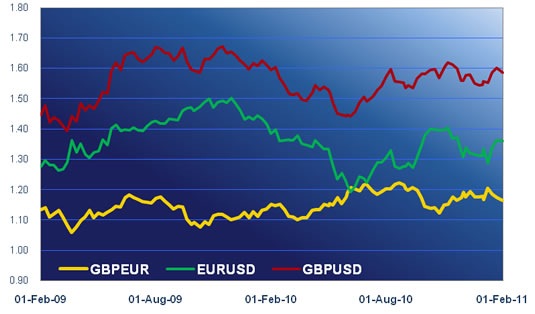When Libya printed LD2 billion of new money (in Britain) the UK government banned the export of the cash, arguing that it was part of a cynical ploy by a deeply unpopular regime to retain its hold on power. When Britain printed £200 billion of new money they called it quantitative easing.
So did it work? By and large, yes, but Britain’s economic hiccup in the final three months of last year was worse than previously thought. The first revision to fourth quarter gross domestic product (GDP) showed that instead of shrinking by -0.5% the UK economy shrank by -0.6%. The news cost sterling half a cent there and then against the US dollar and the euro. No surprise then, at least as far as the initial reaction was concerned, but look what happened afterwards: Less than 15 minutes later the pound had begun a rebound against the euro and by the end of lunchtime had recovered to its pre-disappointment level.
It was not until mid-afternoon that sterling found support against other currencies. Against the day’s winner, the Canadian dollar, it carried on lower for the rest of the day. There was no single or obvious reason for the euro’s retreat but that is what it amounted to. Blame it on end-of-week profit-taking or the Irish election or a dose of reality about the situation in Portugal. Pick one, it does not really matter which; the euro exhibited its vulnerability in no uncertain way. Certainly there were no euro zone ecostats to get in its way. The only figure of any consequence from Euroland was German consumer price index inflation. It came in at 2%, exactly as forecast.
Four hours after the disappointment of Britain’s GDP number it was the turn of the US economy to underwhelm. After a first estimate of 3.4% GDP growth in Q4 analysts had marked down to 3.3% their forecast for the first revision. In fact the figure turned out to by 2.8%. Because the US GDP numbers are quoted as an annualised rate that downgrade is less dramatic than it might at first appear. On a quarterly basis it means a downgrade from 0.8% to 0.7%, still a useful performance. So unworried were investors by the news that they continued to buy the dollar for another hour and a half, taking it half a cent further ahead against the pound and the euro.
Perhaps it was because they were anticipating a decent showing by the University of Michigan’s index of consumer confidence. If so they will not have felt let down by a two and a half point improvement to 77.5 and an upward revision of nearly one point to the previous month’s figure. But instead of taking the dollar further ahead the Michigan confidence figure pulled the trigger on a round of profit-taking. Sterling rebounded by more than half a cent from its low. There was a bounce for the euro too but it was not so high or so prolonged. It starts the week lower against the pound than it opened on Friday.
Japanese figures released earlier today included an improvement in the manufacturing purchasing managers’ index (PMI) from 51.4 to 52.9, a 2.4% monthly increase in industrial production and a 4.1% rise in retail trade. There was no reaction whatsoever from the yen. The New Zealand dollar responded positively to an unexpected $11 million trade surplus but not at all to an improvement in business confidence from 29.5 to 34.5.
The most important figure yet to come this morning is the finalised Euroland consumer price index at ten o’clock. The first estimate was of 2.4% inflation and that number will probably remain unchanged today. What the figure will do, however, is remind investors that the European Central Bank meets this week to discuss monetary policy. Will there be any change to policy on Thursday or will it just be more fighting talk?
After lunch Canada reveals its fourth quarter GDP figure, expected to be an annualised 2.9%; a quarterly 0.7% and almost identical to the US performance. From the States come personal income and spending, pending home sales and the Chicago PMI. Tonight brings Australian and Chinese manufacturing PMIs.
There are no sterling-oriented data on the agenda until the Nationwide house price index early tomorrow. The pound will be left to react to events rather than leading them but at least it seems not to be suffering too deeply from Friday’s GDP injuries.






